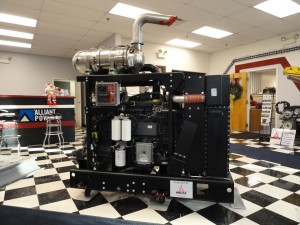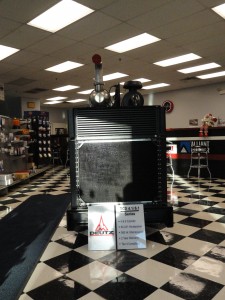The diesel engine is increasingly becoming a standard for drivers who need dependable and cost-efficient transportation. Relying on compression ignition and diesel fuel, inventor Rudolph Diesel’s motor has spawned an industry known for fuel economy. With fuel prices continuing to rise along with demand, high-powered diesel engines can provide benefits that outweigh those of engines run by gasoline.
How Does Diesel Work?
 One major difference between diesel and gas engines is their ignition process. Gas engines run with spark ignition. Diesel engines use compression ignition. The fuel pulls into the engine and is subjected to high compression. That compression creates heat; diesel engines function at much higher temperatures. When the system achieves optimum pressure and temperature, the fuel that enters the engine ignites, with the heat of the combustion chamber causing a reaction between the diesel and the oxygen. A vehicle’s exhaust systems can expel any by-products.
One major difference between diesel and gas engines is their ignition process. Gas engines run with spark ignition. Diesel engines use compression ignition. The fuel pulls into the engine and is subjected to high compression. That compression creates heat; diesel engines function at much higher temperatures. When the system achieves optimum pressure and temperature, the fuel that enters the engine ignites, with the heat of the combustion chamber causing a reaction between the diesel and the oxygen. A vehicle’s exhaust systems can expel any by-products.
Diesel engines receive fuel and air at varying junctures during operation. A gas engine receives a mixture of gas and air to run. A diesel engine compresses only air, so intake throttling is unnecessary to control power within it. Diesel engines require a fuel injector to operate, while gasoline engines use a carburetor or gasoline injectors.
But why buy diesel? Is diesel better? There are certainly pros and cons of diesel engines. It’s no secret that diesel engines can be noisier, and their fuel typically costs quite a bit more than standard gasoline. The reason for this is density. Diesel’s energy density is far higher, so the same amount of diesel provides much more energy than its counterpart. Diesel Fuel has a longer combustion process (burning process) which results in a higher torque curve. As a result, diesel offers much higher mileage. These engines also have a long lifespan with proper maintenance.
Adding to that their greater torque and functionality in colder temperatures, the advantages of diesel engines give it applications in heavy-duty transport vehicles like long-haul trucks and equipment, power generators, and construction equipment. Overall, this engine type continues to draw greater attention for its fuel-related advantages.
Benefits of Using Diesel Engines
Why is diesel better than gas? 
- Durability. Diesel engines last longer than others. A variety of reasons contribute to this fact. Diesel engines use stronger parts to support stressors like heavier vehicles or machines. The fuel’s lubricating properties are far superior to those of gasoline, which is another element credited with better reliability and strength.
- Energy density. Another benefit of diesel is that you are able to extract more energy out of it than gasoline, and so less diesel is necessary for longer distances.
- Fewer parts. As diesel engines do not have distributors or spark plugs, fewer parts can lead to fewer necessary tune-ups. However, this is with the caveat that diesel engines do require regular filter and oil changes to continue running smoothly due to diesel’s high viscosity.
- Fuel efficiency. The greatest advantage diesel offers is its fuel-efficiency, which translates to cost savings. Diesel engines burn less fuel than a gas-powered vehicle in the long run while doing the same amount of work. If you have two automobiles, one diesel, and one gas, and fill them with the same amount of fuel, you will travel much farther in the diesel vehicle.
- Improvements in clean energy. Diesel engines are cleaner than before, with a smaller carbon footprint. Scientists discovered new methods in 2015 of harnessing diesel for even cleaner-burning engines. The estimate at the time was that these new engines could be available to the public within five to 10 years.
- Safety. Another factor in the growing demand for diesel engines is that of safety. Simply put, diesel isn’t remotely as dangerous as gasoline. The fuel and its vapors are much less combustible and volatile. Diesel also doesn’t release the same amount of fumes as gas.
Diesel Engines & Products From Central Diesel, Inc.
The benefits of diesel cars and engines make them a great choice for applications in the marine, rental, mining, construction, military, state and federal government, agriculture, and transportation industries. Central Diesel can help you meet your engine requirements in these fields.
We began in 1972 as a supplier of diesel engines and parts. Since then, Central Diesel is proud to have gained over 4,000 loyal customers by striving for 100% customer satisfaction. We continue to be a distributor for a growing number of esteemed product lines such as Deutz and Mitsubishi.
Please contact us to see our wide variety of diesel engines & learn how we can serve your diesel needs. You can also request further information on our products.




